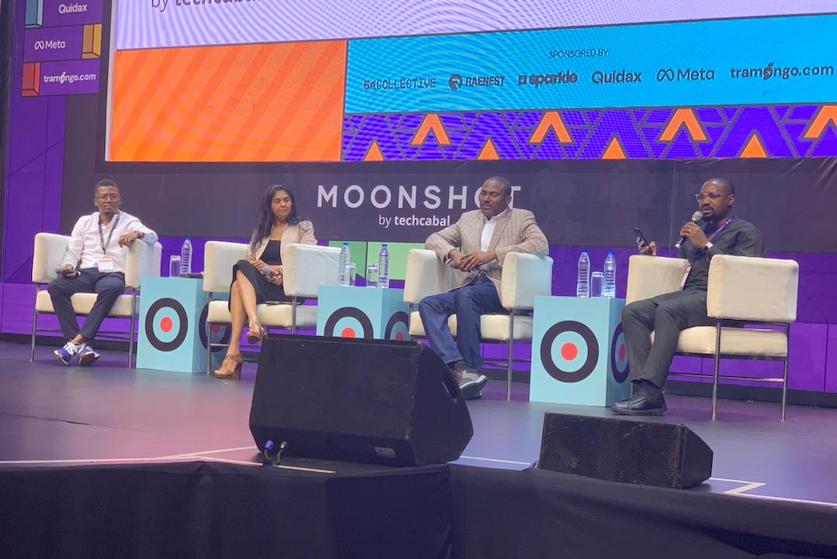This year’s edition of Moonshot, TechCabal’s flagship tech conference, was bigger and better than ever.
The sold-out tech conference attracted more than 3,000 attendees – investors, founders, business leaders, regulators, policymakers, operators, and tech enthusiasts from across Africa’s tech ecosystem.
The CEO of Big Cabal Media (the parent company of TechCabal), Tomiwa Aladekomo, said, “This year at Moonshot, the builders and innovators are coming together to transform Africa’s challenges into solutions that can be exported to the world.”
What is Moonshot
Now in its second year, Moonshot is one of Africa’s largest and most established venture conferences. The jam-packed two-day event featured startup pitches, panel discussions, fireside chats, mixers, TED-style talks, masterclasses, workshops, and networking opportunities. It ran from Wednesday, October 9, to Thursday, October 10, at the Eko Convention Centre in Lagos, Nigeria.
Some of the dignitaries who graced the event were Bosun Tijani, Nigerian’s Minister of Communications, Innovation and Digital Economy; Hannatu Musa Musawa, Minister of Art, Culture and Creative Economy; Kashifu Inuwa Abdullahi, CCIE, Chief Information Technology Officer, Nigeria; Tomi Davies, Collaborator-in-Chief, TVC Labs; Iyin Aboyeji, Founding Partner, Future Africa; Jeremy Johnson, Co-founder and CEO of Andela; June Angelides MBE, Partner, Levare Ventures & Angel Investor; Marlon Nichols, Founding Managing Partner, MaC Venture Capital and others.
The event was expanded to eight content tracks from six in 2023. They are Govt & Policy, Emerging Tech, Startup Festival, Future of Commerce, CleanTech, Roundtable Room, Creative Economy, and Big Tech & Enterprise.
UrbanGeekz Tech Reporter Stephen Oluwadara at MoonShot by TechCabal 2024 at Eko Convention Centre, Lagos, Nigeria, which took place the 9th and 10th of October, 2024.
What The Experts Said in Moonshot
Speaking during his fireside chat on “Building for the world: A conversation about how Africa’s digital Economy can compete,” Nigerian’s Minister of Communications, Innovation and Digital Economy, Bosun Tijani, said Artificial Intelligence (AI) could transform the country into an economic powerhouse.
“We would have failed our people and the future generation if we sleep on artificial intelligence because these are a set of technologies that will control what you think, how you think, and how you do everything,” he said.
Furthermore, there was a panel conversation on “The Battle for Representation: How Africa Produces its Own Data for Global AI Platforms.” The panellists who spoke at the session were Bayo (Olubayo) Adekanmbi, Founder of Data Science Nigeria; Olumide Okubadejo, Head of Product, Sabi; and Lavina Ramkisson, AI Board, GSMA.
Adekanmbi believes that AI offers Africa an opportunity to be at the cutting edge of technology. To ensure Africa’s AI talent pool is globally relevant, talents must seek knowledge and not depend on what they learn in school.
Olumide Okubadejo, Head of Product at Sabi, agrees that public and private partnerships are a great way to improve data collection and AI adoption on the continent.
In addition, there was another panel session on “The Globa View: Why the World is Investing in Africa,” featuring the following speakers: Sadaharu Saiki, Founder and GP of Sunny Side Ventures; Aaron Fu, Director of Venture Investments at DCG; and Alisha Golden, Investment Manager at TechStars.
Related Post: The Lagos Tech Fest Returns Bigger and Better
The panellist agreed that African startups could build scalable solutions across the global market; however, they need support in funding, access to networks, and market knowledge to achieve their international ambitions.
Penetrating foreign markets requires African startups to have a clear idea of what it takes to succeed in different countries. “It seems obvious, but what works in African markets might need significant tweaking to work in markets like LatAm and Southeast Asia,” said Sadaharu Saiki.

